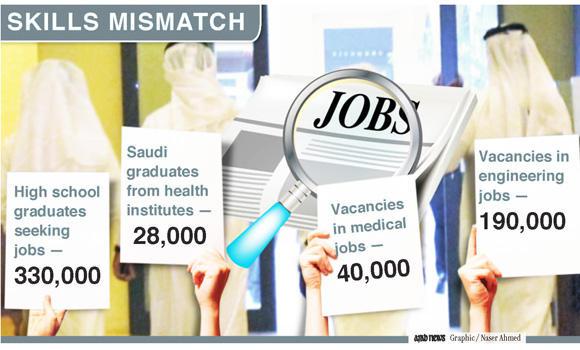
Jeddah, Jun 9: A businessman here has urged the state to overhaul the country’s education system so Saudis could be trained for jobs needed. He also called on the government to set up a statistics agency that could provide “accurate” data on the Saudi labor market, including the number of Saudis without work and their levels of education.
It was recently revealed that there are 40,000 medical and 190,000 engineering job vacancies in the country that could be filled by Saudis. In addition, an annual average of 330,000 Saudi high school graduates prefers to seek work rather than study further.
Mohamed Al-Turki, chairman and CEO of MTMM Engineering Consultancy, said this would help the government develop a proper plan to educate and employ Saudis in line with market needs.
Al-Turki said current statistics are not accurate. “I don’t think we have a proper statistics agency that can tell us the exact number of unemployed. What we read in the press is not accurate, and we can’t depend on Hafiz data,” he said.
“If we refer to Hafiz, the number of unemployed is really high, but we can’t determine whether they are educated or not,” he said.
Al-Turki said the unemployment problem could only be solved if businesspeople have access to a database that identifies the number of unemployed, their level of education and market needs. He added that the Ministry of Higher Education should also help in this process. “The ministry of labor is definitely doing its best to solve a high profile issue. However, I believe that without changing the education system to meet market demand, the unemployment issue will not be solved,” said Al-Turki.
According to statistics, there are 333,075 foreign nurses, taking up 88 percent of the country’s nursing jobs, while there are an estimated 333,045 trained Saudi nurses.
Abdulrahim Gari, internal medicine and hematology consultant and member of the medical health committee at the Jeddah Chamber of Commerce and Industry (JCCI), said there is high demand in the Kingdom for medical workers.
“Unfortunately, most Saudis don’t have a good understanding of what it means to have a good work ethic. Medical jobs require qualified people who have the proper work ethic,” he said.
“Most unemployed Saudis have BA degrees in education and other fields that do not fulfill Saudi market needs. We have vacancies in the private and government medical sector, and if I receive applications from Saudi nurses, technicians or doctors, I will hire them for sure.”
He said many graduates are not qualified to fill medical jobs. “If we speak about the 28,000 Saudis who just graduated from medical institutes, they are not qualified enough, which is why the Saudi Commission for Health Specialties has not (certified) them,” he said.
Gari said there would be rising demand for medical jobs because of the increasing Saudi population, the rise in the number of elderly people, and the prevalence of obesity and diabetes.
Ahmed Omar Al-Sanousi, CEO of Prince Sultan Cultural Center, said Saudis must prepare themselves to take up new professions rather than depending on jobs in traditional areas of work. “I think that young Saudis’ views about work have changed and will continue to change.”
He also called on the labor ministry to get a broad range of data on the labor market. “The high unemployment rate has been determined by the labor ministry, but doesn’t reveal the background of the unemployed. I think we need a detailed database that defines accurately the number of employees, their education and their background,” he said.








Comments
Add new comment